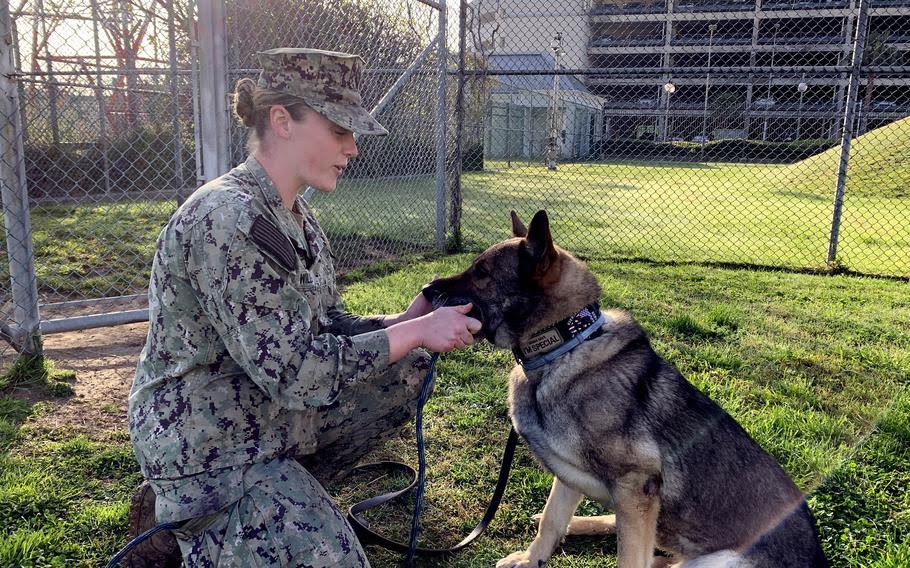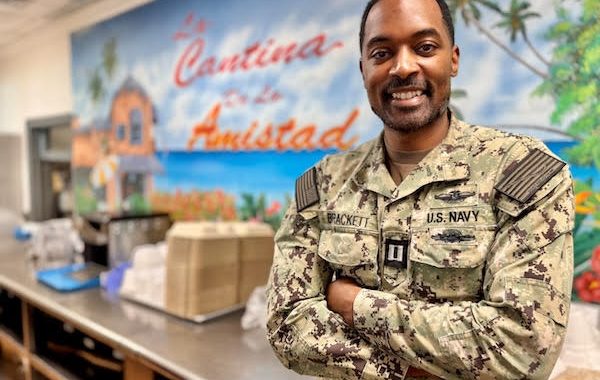All paws on deck: Army veterinarian, Navy hospital form treatment tandem for working dogs
4 min read
Seaman Emily Willis, a military working dog handler, gives a chew toy on March 31, 2023, to Toto, an 8-year-old German shepherd who serves at Naval Support Activity Naples in Italy. Toto’s veterinarian said he wouldn’t have survived had he not received a lifesaving medical evacuation, which was organized by staffers at the base’s hospital.
NAPLES, Italy — It won’t be long before military working dog Toto is living la dolce vita, but the 8-year-old German shepherd at Naval Support Activity Naples almost didn’t get that chance.
“Ï thought he was going to die,” said U.S. Army Capt. Paulynne Bellen, a veterinarian assigned to the base who cares for its military working dogs.
Last year, Toto developed a catastrophic infection in his right hind leg. Bellen knew he needed more care than she could provide but worried that he wouldn’t survive the wait for transport to Veterinary Medical Center Europe in Kaiserslautern, Germany, where military working dogs in Europe, the Middle East and Asia are routed for surgeries.
But thanks to a lifesaving medical evacuation to Germany traditionally used for humans and organized by the base’s hospital, Toto is healthy and looking toward retirement and a comfy couch.
His four-month recovery underscores an unusual relationship between the base’s hospital and veterinary clinic that prioritizes the health and well-being of military working dogs to much the same degree as for any other service member.
It’s a commitment that finds the hospital standing in as an important resource for treating four-legged patients, from supplying antibiotics, painkillers and other drugs to sharing equipment, training medical staffers in providing trauma care for dogs and, if needed, arranging an emergency medical evacuation.
“I can’t function without them,” Bellen said of the hospital. “Our partnership is integral so I can support the military working dogs appropriately.”
The Army Veterinary Corps is small. For example, there isn’t a veterinarian at Naval Support Activity Souda Bay in Greece, which relies on the corps staff at a Navy base in Sicily, Bellen said. And last summer, two dogs from NSA Souda Bay were brought to Naples for X-rays and needed medical care.
There are about 1,600 military working dogs in the U.S. armed forces, according to the Defense Department. They are deployed across the services, but only the Army provides veterinary care.
For military working dogs in Europe and the Middle East, it has just one clinic each in Spain, England, Belgium and Turkey as well as four in Italy and eight in Germany, according to the Army’s public health website.
That small footprint means a dog’s handler or a hospital corpsman may have to provide trauma care for an injured animal on the battlefield or in other situations, sometimes without veterinary training.
Navy Capt. Justice Parrott, commanding officer of U.S. Naval Hospital Naples, knows how overwhelming that responsibility can be. Early in his career as a nurse anesthesiologist, Parrott unexpectedly treated a military working dog injured in battle.
While he and others saved its life, the experience was profound, Parrott said.
“I’d never taken care of a dog before,” he said. “At that point, I decided I was never going to let a nurse anesthesiologist or someone else who needs to care for dogs downrange do it without practicing first.”
Since then, Parrott has ensured that the people he trains acquire experience treating dogs so that they will know what to do.
Since arriving in Naples eight months ago, Parrott has worked with Bellen to expand that mission to support the base veterinary clinic in a variety of ways, including routine trauma training.
Bellen will teach a 2 1/2-hour class for hospital corpsmen this month using a simulation dog named Diesel.
Bellen isn’t certain what caused Toto’s infection but suspects that a traumatic puncture injury or a bite by a venomous insect could have been the culprit.
After surgeries that included a skin graft, a month’s stay in Germany with his handler, Seaman Emily Willis, and rehabilitation, Toto is back in service on “light duty.”
In his six years at NSA Naples, he has been dually assigned to patrol and explosives detection. He’s also been deployed to Africa.
But damage from the infection has left Toto unable to perform his duties as easily as before. Bellen is recommending retirement for him and hopes that he will qualify for adoption. She is striving to ensure that Toto makes it to that point.
For her, the dedication shown to Toto during his ordeal embodies the importance of canine military personnel.
“They are a sailor or a soldier like any service member,” Bellen said. “They have served their country in their own capacity.”


